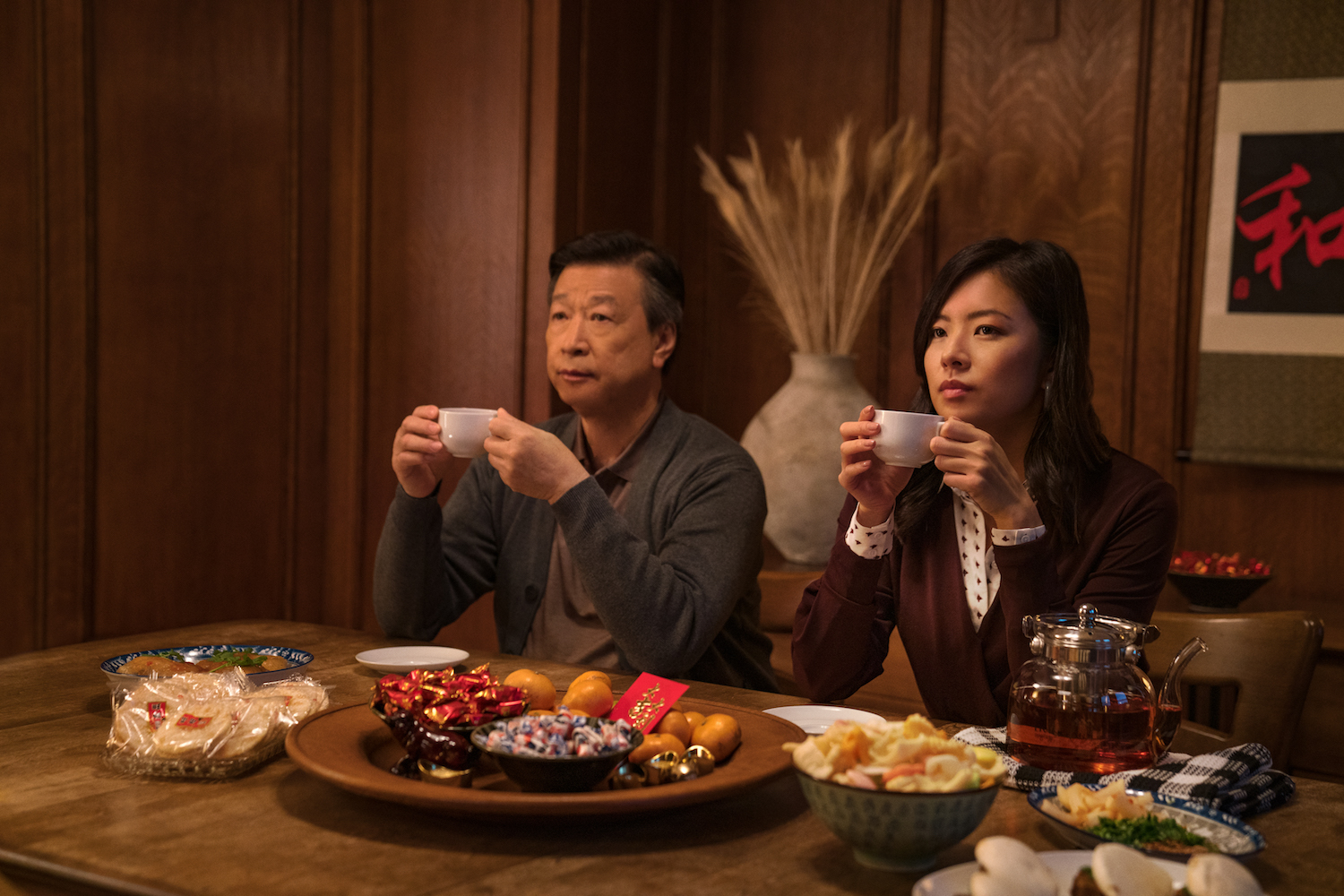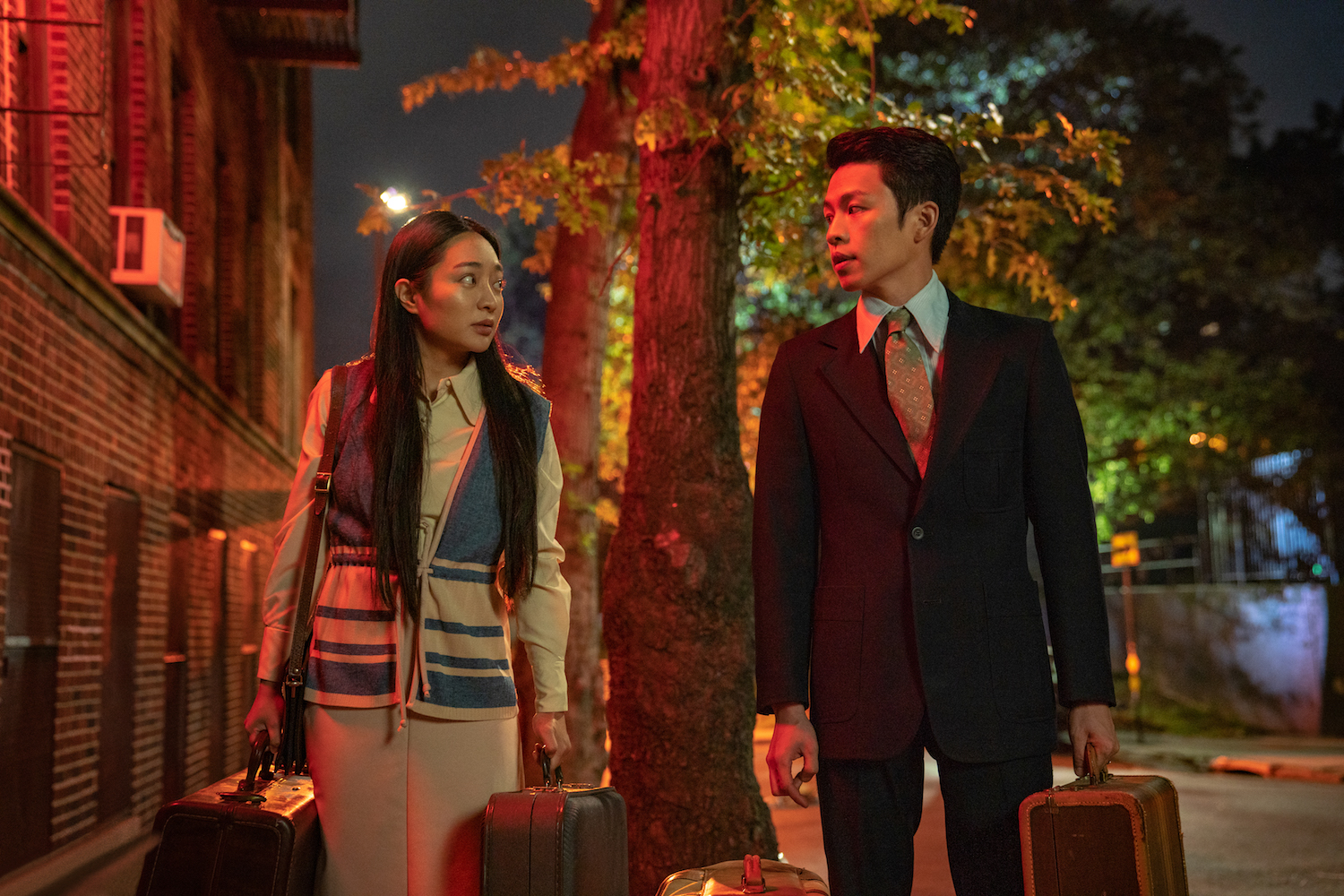Our parents' lives before us are something many of us only know in the broadest of strokes. Their hopes, dreams, and rich interior lives, especially in their younger years, are objects of our imagination—if we even think about those things at all. More often, it's easier to think of our parents as existing only from the point of our own existence.
The distance between our parents' past selves and the versions of them we've known can be multiplied by experiences like migration, which creates not just figurative but also vast oceans of literal distance between those two selves. That's exactly what Alan Yang wanted to dig into with his first feature film, Tigertail. Released today, the Netflix original is Yang's take on his father's immigration story and a reflection on his family's experience of chasing the American Dream. As he weaves together the multi-generational tale, Yang pays homage to his family's sacrifice.
Tigertail centers on the elderly Pin-Jui, played by Tzi Ma and based on Yang's father, who has an icy relationship with his daughter Angela (Christine Ko); his ex-wife (Fiona Fu) has since remarried. As he reflects on his past, he thinks about the relationships that shaped his life: his mother, the woman he loved, the woman he married, and finally, his daughter. Though Yang initially intended to focus on more viewpoints, he told VICE, "Ultimately, I felt like the heart of the story is with my father."
The film splits its focus between present-day Pin-Jui and past Pin-Jui. During his early life in Taiwan, he falls in love with a woman over a shared spontaneity and a love of music. But working in a run-down factory with his single mother, Pin-Jui sees promise beyond Taiwan, and he takes up an offer to marry another woman in exchange for life in the United States. Shifting between timepoints, we learn how the pressures of Pin-Jui's experience have shaped his identity, his dreams, and his relationships.
Though Tigertail was deeply shaped by reality, there's a bit of Yang's own projection and imagination in the film.
"I did do research and talk to [my parents] a fair amount, but really, I wanted to thread the needle of getting some good stories from them and their emotions and motivations from moment to moment—but not so detailed an accounting that it limited the potential for imagination in the movie and for finding the poetry in the stories," Yang said.
As Tigertail bridges two versions of his father—the one he knows, and the one who exists only in imagination and memory—Yang wrestles with the fact that his father had a life before him. By telling the story of that life, interpreted through Yang's own artistic vision, he gives weight to the people his parents used to be and grapples with the things they gave up, like love, comfort, and familiarity. Tigertail acknowledges all the aspirations that went unrealized.
Integral to that understanding was a trip Yang took to Taiwan with his father a few years ago. To Yang, who was born in California, it didn't quite feel like a return. "...It's getting to know your parents better and getting to know yourself better because they're part of you," he said.
"You're seeing what they loved growing up, you're seeing where they were growing up, what was the weather like, what was the architecture like, what was it like to walk around—even though these cities have changed, the streets have changed. Certainly Taiwan has changed as a country, but going back did help to fill in who my dad was and who my parents were."

While the sacrifices of immigrant parents often exist in silence, Yang's vivid depiction of Pin-Jui as a developing person wrestling with his own priorities and dreams is a way of coming to terms with reality. In doing so, Tigertail offers the deep-reaching "thank you" that many children of immigrants might struggle to say.
Tigertail will be particularly hard-hitting for immigrants and their children. During and after the movie, I couldn't stop crying. There are differences between it and my own immigration story, but there are enough similarities for it to hit a nerve: my parents moved to an area with few Asian people and barely knew anyone; I don't really know the reality of my family's previous life in the Philippines; like Pin-Jui, my father is reserved about his emotions and experiences.
The idea of simply saying "thank you" seems so painfully feeble a phrase. While I know that my parents sacrificed for my sake, I'll never really know how much, and "thank you" feels like nothing to people who gave up everything. As grateful as we might be as children of immigrants, there is plenty we might take for granted—but Tigertail and Yang's experience of making it provide the suggestion that one day, we can fully understand.
"Later in life, I think you appreciate the sort of discipline that [your parents] instill in you and obviously the sacrifices they made and just how epic their lives were," Yang said. "I think about [my parents] walking around the Bronx in the 70s, when there were almost no Asian people who were their friends. They were just all alone in this new country just learning the language and overcoming all these obstacles. It's really in some ways a heroic journey and you think about it as, 'Oh yes, my parents.'"
"They seem to have these very normal lives, but they've gone through a lot, and I don't think we say 'thank you' enough. In some ways this movie is a thank you to both of them. They've both seen the movie now, and my dad said he's seen it three times—because I sent it to him a few days ago—and he wants to watch it 10 times before it comes out, so I feel like he appreciates it. I hope it worked as a thank you."

Tigertail is more than just a movie for immigrants and their children, and it's more than a movie for the Asian American diaspora, as much as it might speak to our lived experiences. Daughters of distant fathers everywhere might find similarity in Angela's tensions with her father's hardened emotional shell, and anyone who can name their "one who got away" will find kinship in Pin-Jui's heartbreak. Tigertail is for everyone with a family, and especially everyone with a complicated family.
It's for the people who have things they wish they could know about the people close to them and people who have things they wish they could say but don't quite know how. Isn't that one of the most universal human experiences?
Sign up for our newsletter to get the best of VICE delivered to your inbox daily.
Follow Bettina Makalintal on Twitter.
from VICE https://ift.tt/2VhtnRd
via cheap web hosting
No comments:
Post a Comment